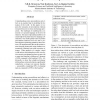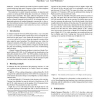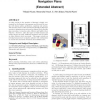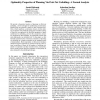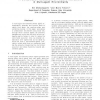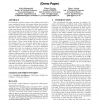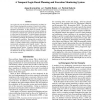122
click to vote
ACL
2012
13 years 4 months ago
2012
Comprehending action preconditions and effects is an essential step in modeling the dynamics of the world. In this paper, we express the semantics of precondition relations extrac...
131
click to vote
ECAI
2008
Springer
15 years 3 months ago
2008
Springer
In many domains successful execution of plans requires careful monitoring and repair. Diagnosis of plan execution supports this process by identifying causes of plan failure. Most ...
112
click to vote
ATAL
2010
Springer
15 years 3 months ago
2010
Springer
d Abstract) Thibault Kruse, Alexandra Kirsch, E. Akin Sisbot, Rachid Alami A robot moving in the presence of humans is highly constrained by the dynamic environment and the need t...
109
click to vote
AIPS
2009
15 years 3 months ago
2009
We provide a theoretical analysis of planning via Petri net unfolding, a novel technique for synthesising parallel plans. Parallel plans are generally valued for their execution f...
102
click to vote
IJCAI
1993
15 years 3 months ago
1993
In multi-agent environments where agents independently generate and execute plans to satisfy their goals, the resulting plans may sometimes overlap. In this paper, we propose a co...
126
click to vote
AAAI
1994
15 years 3 months ago
1994
Between sensing the world after every action (as in a reactive plan) and not sensing at all (as in an openloop plan), lies a continuum of strategies for sensing during plan execut...
103
click to vote
AAAI
1998
15 years 3 months ago
1998
Temporal plans permit significant flexibility in specifying the occurrence time of events. Plan execution can make good use of that flexibility. However, the advantage of executio...
127
click to vote
ATAL
2008
Springer
15 years 4 months ago
2008
Springer
In the complex, dynamic domain of Air Traffic Control (ATC) many unexpected events can happen during the execution of a plan. Sometimes these disruptions make the plan infeasible ...
139
click to vote
AIPS
2008
15 years 4 months ago
2008
As no plan can cover all possible contingencies, the ability to detect failures during plan execution is crucial to the robustness of any autonomous system operating in a dynamic ...
117
click to vote
AIPS
2007
15 years 4 months ago
2007
Autonomous systems operating in real-world environments must be able to plan, schedule, and execute missions while robustly adapting to uncertainty and disturbances. Previous work...
